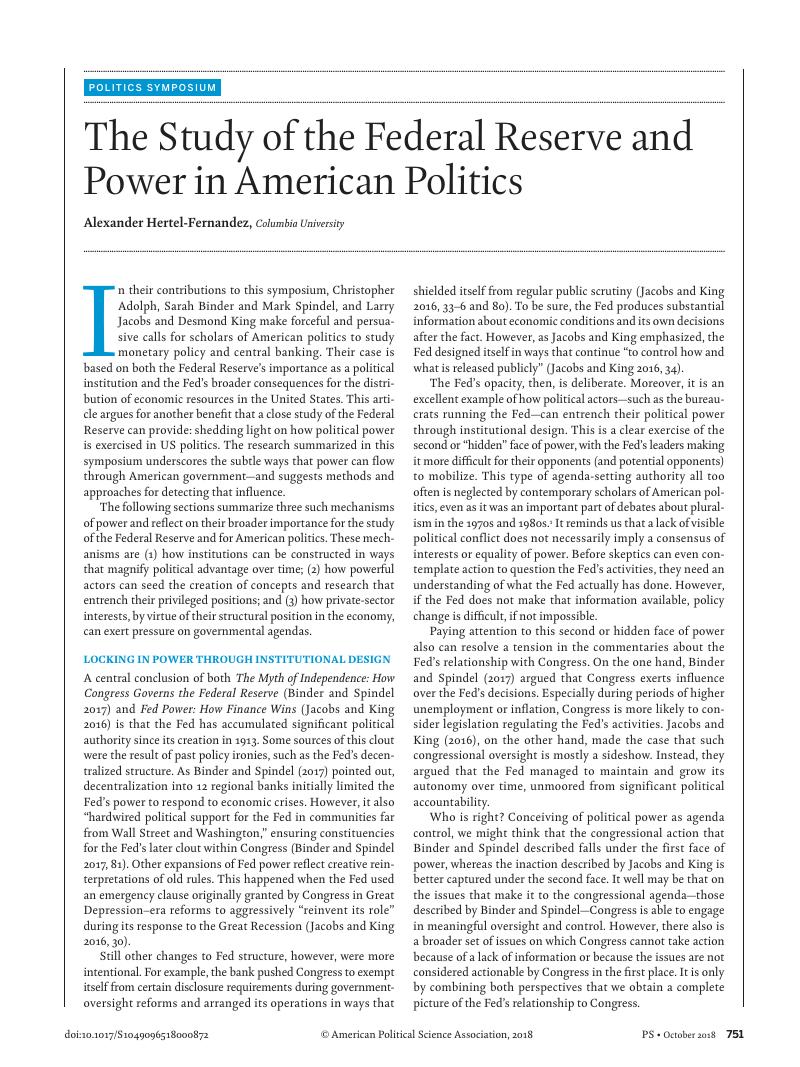No CrossRef data available.
Article contents
The Study of the Federal Reserve and Power in American Politics
Published online by Cambridge University Press: 20 July 2018
Abstract
An abstract is not available for this content so a preview has been provided. Please use the Get access link above for information on how to access this content.

- Type
- Symposium: American Oligarchy? The Concealed Politics of the Federal Reserve Bank
- Information
- Copyright
- Copyright © American Political Science Association 2018
References
REFERENCES
Adolph, Christopher. 2013. Bankers, Bureaucrats, and Central Bank Politics. New York: Cambridge University Press.CrossRefGoogle Scholar
Bachrach, Peter, and Baratz, Morton S.. 1962. “Two Faces of Power.” American Political Science Review 56 (4): 947–52.CrossRefGoogle Scholar
Bernstein, Jared, and Baker, Dean. 2003. The Benefits of Full Employment: When Markets Work for People. Washington: Economic Policy Institute Books.Google Scholar
Binder, Sarah, and Spindel, Mark. 2017. The Myth of Independence: How Congress Governs the Federal Reserve. Princeton, NJ: Princeton University Press.Google Scholar
Carpenter, Daniel. 2010. Reputation and Power: Organizational Image and Pharmaceutical Regulation at the FDA. Princeton, NJ: Princeton University Press.Google Scholar
Crenson, Matthew A. 1971. The Un-Politics of Air Pollution: A Study of Non-Decisionmaking in the Cities. Baltimore: Johns Hopkins University Press.Google Scholar
Culpepper, Pepper, and Reinke, Raphael. 2014. “Structural Power and Bank Bailouts in the United Kingdom and the United States.” Politics and Society 42 (4): 427–54.CrossRefGoogle Scholar
Doherty, Brian. 2007. Radicals for Capitalism: A Freewheeling History of the Modern American Libertarian Movement. New York: Public Affairs.Google Scholar
Fourcade, Marion. 2009. Economists and Societies: Discipline and Profession in the United States, Britain, and France, 1890s to 1990s. Princeton, NJ: Princeton University Press.Google Scholar
Grim, Ryan. 2013. “Priceless: How the Federal Reserve Bought the Economics Profession.” The Huffington Post, October 23, 2009 (updated May 13, 2013).Google Scholar
Hacker, Jacob S., and Pierson, Paul. 2002. “Business Power and Social Policy: Employers and the Formation of the American Welfare State.” Politics and Society 30 (2): 277–325.CrossRefGoogle Scholar
Hertel-Fernandez, Alexander. 2018. “Policy Feedback as Political Weapon: Conservative Advocacy and the Demobilization of the Public-Sector Labor Movement.” Perspectives on Politics 16 (2): 364–79.CrossRefGoogle Scholar
Jacobs, Lawrence R., and King, Desmond. 2016. Fed Power: How Finance Wins. New York: Oxford University Press.Google Scholar
Jelveh, Zubin, Kogut, Bruce, and Naidu, Suresh. 2015. “Political Language in Economics.” Unpublished working paper.Google Scholar
Kwak, James. 2014. “Cultural Capture and the Financial Crisis.” In Preventing Regulatory Capture: Special Interest Influence and How to Limit It, ed. Carpenter, Daniel and Moss, David A., 71–98. New York: Cambridge University Press.Google Scholar
Lindblom, Charles. 1982. “The Market as Prison.” Journal of Politics 44 (2): 324–36.CrossRefGoogle Scholar
Mahoney, James, and Thelen, Kathleen (eds.). 2009. Explaining Institutional Change: Ambiguity, Agency, and Power. New York: Cambridge University Press.CrossRefGoogle Scholar
McCall, Leslie. 2013. The Undeserving Rich. New York: Cambridge University Press.CrossRefGoogle Scholar
Moe, Terry. 1995. “The Politics of Structural Choice: Toward a Theory of Public Bureaucracy.” In Organization Theory: From Chester Barnard to the Present and Beyond, ed. Williamson, Oliver E., 116–53. New York: Oxford University Press.Google Scholar
Moe, Terry. 2005. “Power and Political Institutions.” Perspectives on Politics 3 (2): 215–33.CrossRefGoogle Scholar
Pierson, Paul. 2015. “Goodbye to Pluralism? Studying Power in Contemporary American Politics.” Prepared for presentation at the Wildavsky Forum for Public Policy, Goldman School of Public Policy, April. Berkeley: University of California.Google Scholar
Skocpol, Theda, and Hertel-Fernandez, Alexander. 2016. “The Koch Network and Republican Party Extremism.” Perspectives on Politics 14 (3): 681–99.CrossRefGoogle Scholar




